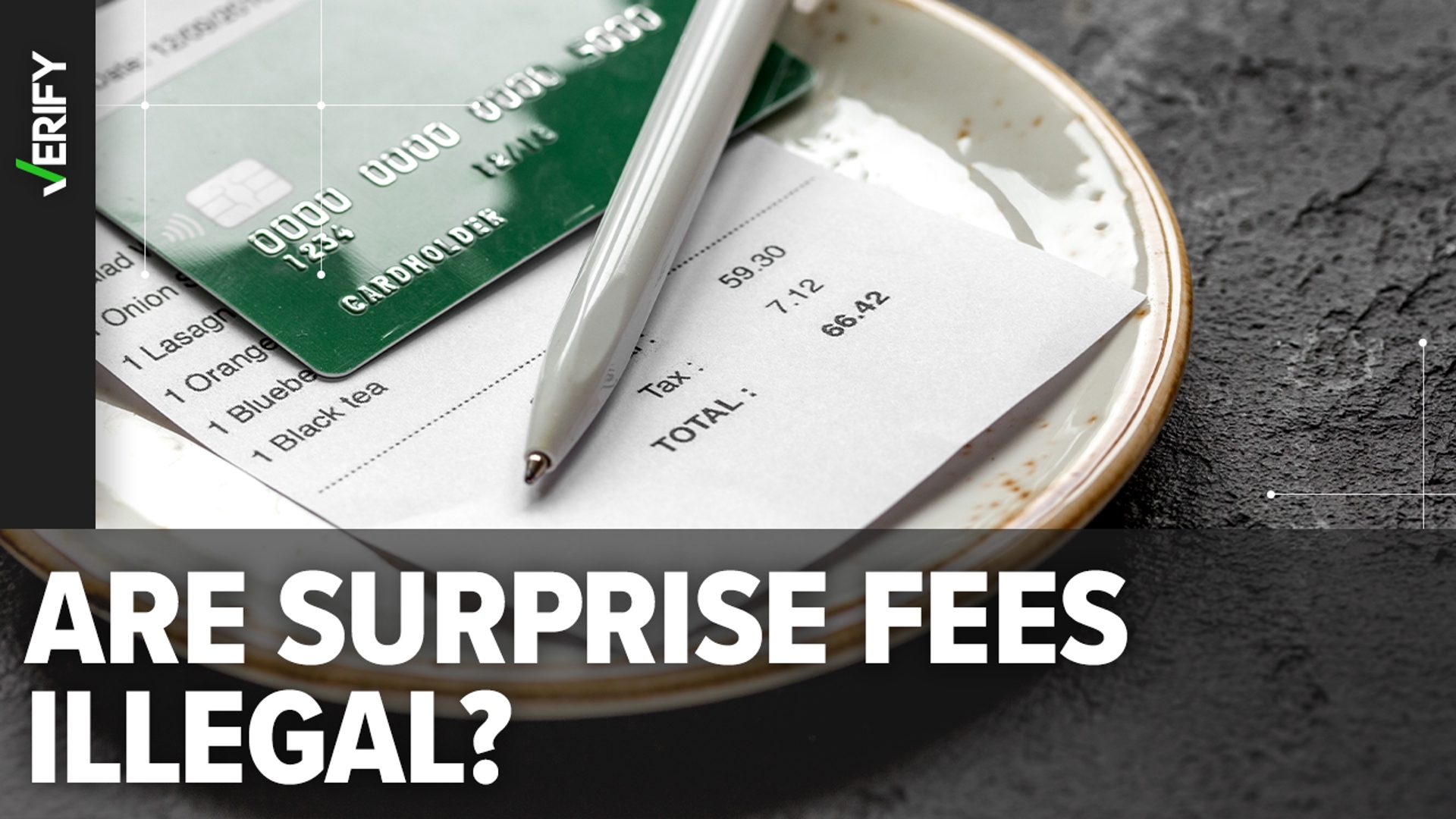A new type of sticker shock has become familiar to American consumers in the last few years: getting a bill at a restaurant only to see an unexpected surcharge tacked on.
Sometimes, restaurants will include a description of the fee on a menu or somewhere else on the premises, but other times customers may be surprised with a fee for the first time when they get the check at the end of their meal, and it may be unclear what the fee is for. As such, unexpected charges are often called “junk fees.”
Some people have suggested that surprise fees are illegal, since the customer is being charged a price higher than what they were aware of when they ordered.
THE QUESTION
Are surprise restaurant surcharges illegal?
THE SOURCES
THE ANSWER
Whether a surprise restaurant surcharge is illegal currently depends on what state or city you’re in. Some jurisdictions have laws explicitly prohibiting junk fees, but many do not.
WHAT WE FOUND
Currently, there’s no federal law prohibiting junk fees, regardless of whether a customer is informed in advance or not. Some states have banned these types of charges, but they remain legal in much of the country.
A group of senators proposed a bill in Congress that would require businesses to inform customers of any extra fees before they order and clearly explain what the fees are for. But that bill has not gained any momentum since it was first introduced last year and has yet to receive a committee hearing.
The Federal Trade Commission is considering issuing a new rule which could have similar effects to the proposed bill. Rules are essentially an announcement by federal agencies of how they intend to enforce existing laws, and can be changed by later administrations.
President Joe Biden has long advocated for such a regulation, but the FTC rule is still in its early stages and is unlikely to take effect anytime soon. The rule would apply to junk fees at restaurants as well as several other businesses, such as hotels and ticket vendors.
There’s also been momentum towards banning junk fees on the state and local level.
The attorney general in Washington, D.C. issued guidance in 2023, which said existing consumer protection laws in the district prohibited surprise surcharges.
“To comply with these laws, restaurants should… clearly and prominently disclose fees at the beginning of the ordering process… [and] accurately describe the reason for the fee,” the guidance read in part.
In California, a new law that’s set to take effect in July 2024 explicitly prohibits any business from charging nearly all extra fees, regardless of whether the customer is informed in advance.
The law says restaurants, for example, have to bake any surcharges into the actual listed prices on the menu, meaning they can’t tack on any fees even if they’re advertised ahead of time. The only exceptions are for taxes and shipping costs. Tips aren’t affected by the law as it only pertains to mandatory fees, not optional ones.
Other states are considering similar laws, but they have not yet been passed.
Because the laws on fees are rapidly changing around the country, and attorneys general could find provisions in existing law that they deem effectively prohibits junk fees, some restaurant trade groups have warned their members against charging surprise fees, even in places where they aren’t explicitly illegal right now.
For instance, the Oregon Restaurant and Lodging Association published guidance which recommends, among other things, that restaurants “provide written disclosure of the service charge before the customer orders any food or beverage item… in a manner that calls the customer’s attention to the language” and explain what the charge is for.
Still, in most places it remains unlikely that you would have a legal case against a restaurant that charged you a surprise fee.
The National Restaurant Association has opposed measures like the proposed FTC rule, saying restaurants already take significant efforts to avoid surprising customers with their surcharges, and that the restaurants need to charge certain fees to stay afloat.
“From delivery fees to service fees to credit card surcharges, restaurant operators make significant efforts to ensure these fees and surcharges are evident and identifiable before consumers receive the check,” the association said in a statement. “As costs for restaurants have continued to rise, consumers too are feeling inflationary pressures. This – and the reality that diners have extensive choices when eating out – means that consumers are sensitive to any menu price increases.”

